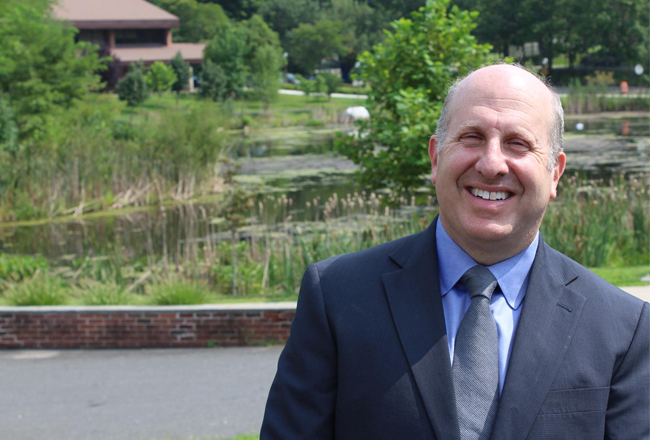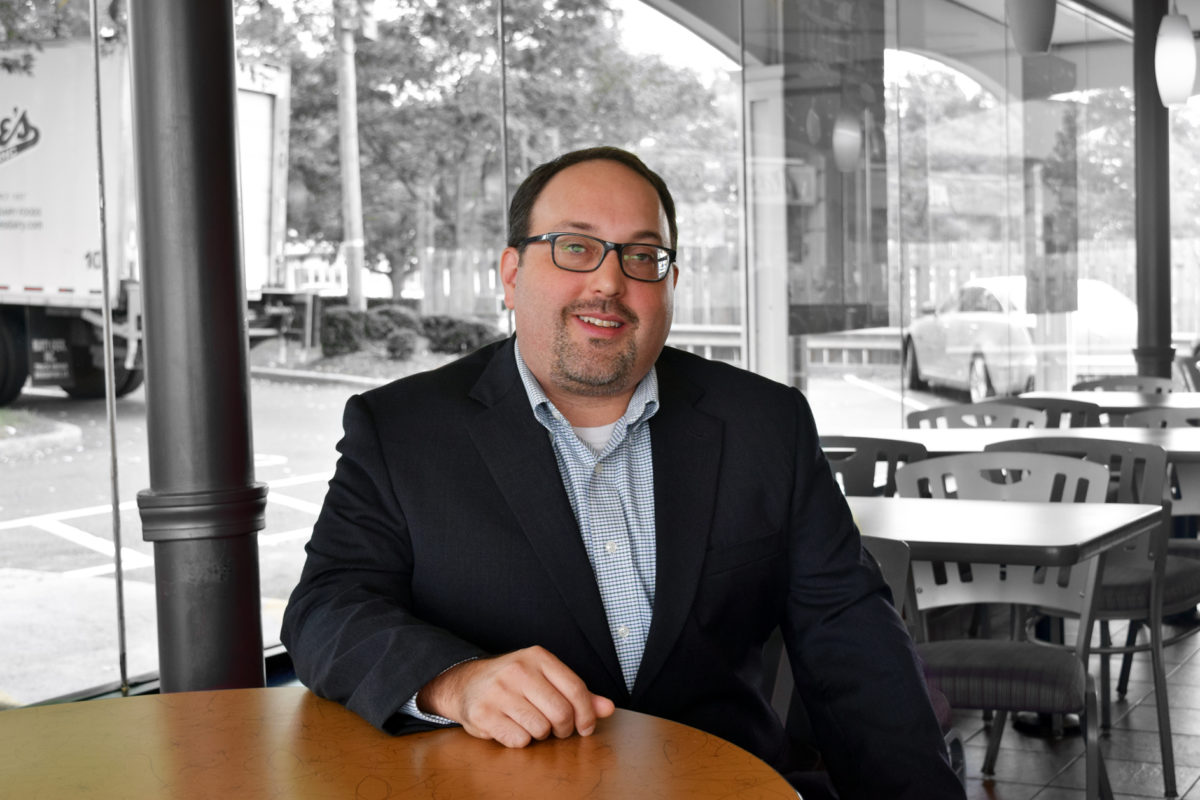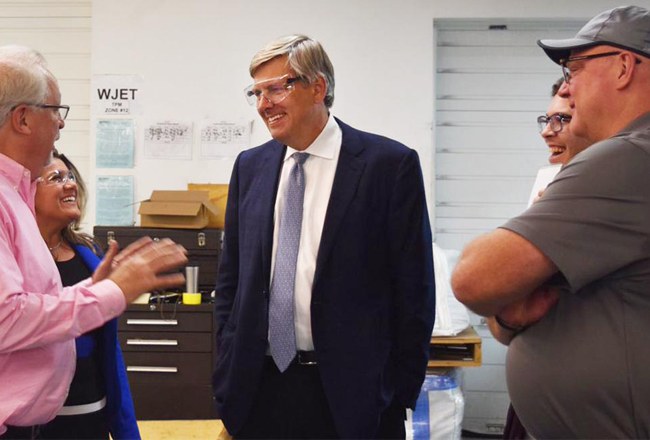Pace University President Marvin Krislov says there are big things happening on the college”™s Pleasantville campus ”” you should stop by.
Krislov took over leadership of the Manhattan and Westchester County college in August 2017 after a decade leading Oberlin College in Ohio. A year into the job, Krislov met with the Business Journal just before the start of the fall semester for a conversation that touched on his drive toward academia, Pace”™s upward mobility and his vision for its Pleasantville campus.
The Pleasantville campus recently underwent about $100 million worth of renovations, including new dormitory buildings, aimed at bringing more student life to the grounds. Now one of his goals, he said, is to bring more visitors to campus for events such as conferences and art shows.
“One of the things I would love to do it is to make this campus more a hub for activity in Westchester,” Krislov told staff reporter Ryan Deffenbaugh in a recent interview. “If any readers have any great ideas, I”™m happy to hear them.”

Krislov brings a long, distinguished resume to Pace. He”™s a graduate of Yale Law School and a Rhodes Scholar in history. His pre-academic career included stops as acting solicitor in the U.S. Department of Labor and an associate counsel to President Bill Clinton. His first post in academia was at the University of Michigan, where he was a vice president and general counsel for a decade. He coordinated the school’s legal efforts in the 2003 landmark Grutter v. Bollinger case, in which the Supreme Court upheld the affirmative action admissions policy of the University of Michigan Law School.
Where are you from originally?
“I grew up in Lexington, Kentucky. My father was a labor economics professor, my mother a social worker. We moved to Kentucky when I was four. Both of my parents were originally from Cleveland. I grew up in Lexington, went to public schools and lived there until I went off to college.”
How was it that you shifted over from law and working in the Clinton administration, to higher education and the job at Michigan?
“The Michigan job was my first full-time job in higher education, although I had taught as an adjunct at (George Washington University Law School).
My parents were educators. ”¦Education really is in my blood. I always felt education, and this I also got from my parents, was the key to opportunity for people. So the Michigan opportunity was a chance to build on my legal career, but also get into education.”
What drew you to Pace?
“I was really inspired when I visited Pace and met our students. Very motivated, largely first-generation, immigrant students, but also just students who were really striving and wanted to make a difference and do well and do well for themselves and their families and their communities.
I just loved that spirit and I liked the fact that Pace”™s mission really links those students, not only with a fine education, with a liberal arts foundation, but also linking them to experiential opportunities, jobs and internships; thinking about launching them into successful careers.”
The enrollment at Pace is about four times the size of Oberlin”™s. Can you describe what differences you”™ve found at the two universities? What similarities?
“The scale is different and there”™s the multiple campuses: we have the Pleasantville campus, White Plains law campus and the Manhattan campus. It”™s a different type of institution. We also have graduate programs; Oberlin was really almost exclusively undergraduates.
I”™ve met with a lot of students and I”™ve been struck by the number who have experiences that are really important to pay attention to. I would include veterans, commuting students and transfer students among those. It”™s very important for us in higher education to be aware of the needs of these different populations, some of which overlap. And increasingly higher education in America is going to need to serve those populations. And so for me one of the exciting parts of being at Pace is thinking about how to think about these different populations.”
What are some of the most important things you”™ve learned about Pace in your first year?
“What I”™ve come to appreciate are the great people and the dedication of the faculty, staff and students. We make a real difference in people”™s lives.
One of the challenges is that some of our students do come from less wealthy backgrounds and I think we need to work very closely with them and their families to make sure that they can afford it. The cost of a private education can be daunting and we do a lot with financial aid, but we also work with families on coming up with plans.
I think the other thing that I would say is how connected we are to the employer community. In Westchester, we have deep relationships with not only the big Fortune 500 companies, but we also have connections to a lot of smaller employers here. Those benefit our students in terms of their jobs and internship opportunities.”
Pace was rated recently in national study (released by the Chronicle for Highest Education last year) as the top university for student upward mobility. What does Pace do well in this regard and how do you build on that?
“We have a method that we call the Pace Path. That is an individualized plan. So if you were to come to Pace, you would have an adviser and sit down with him or her and come up with some goals for you, let”™s say four years, that would include classes, maybe jobs and internships. Of course that can change over time. Relatively few students stick with exactly the plan they enter with. But that helps students think about their educational experience in a more intentional way. It also makes sure that we provide the kind of institutional support that students need and we really try to provide that path to success.”
Pace a couple years ago underwent $100 million in renovations on its Pleasantville campus and sold off its Briarcliff campus. What”™s next for this campus? What”™s your vision for it?
“One of the things that has been very exciting for me is to see a growth in the number of students and I think the new facilities have really helped stimulate that.
Continuing to connect our students through the Pace Path with area employers is critical. One of the things I would love to do is to make this campus more a hub for activity in Westchester. If any readers have any great ideas, I”™m happy to hear them. We have people who are actively pursuing partnerships and there are really good things going on. But I would love Pace to be a go-to place for the business community, the arts community in Westchester.
One of my goals is not only to increase student enrollment, but to take fuller advantage of all the facilities we have here. I think we”™ve made progress in that regard and we can do some more.
I would extend an invitation to people to come to the campus. Look on the website. I think people will be excited by what they see. Whether it”™s for their children or their grandchildren or their neighbors, I think people really should visit. It”™s a great, great place and it”™s a lively campus and lively community.”




















